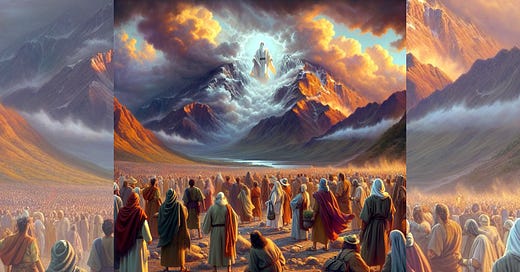On the plains of Moab, east of the river Jordan, on the verge of the entrance to the Promised Land, Moses gave the law (Torah) the second time, as it were, to the children of Israel who grew up in the desert and were promised entrance into the land of Canaan. The entire book of Deuteronomy is covered within the last 2 months of the forty year journey in the wilderness.
This week’s Torah portion (aka, Parasha), from Deuternomy 3:23 to 7:11, is called “Va'etchanan” (וָאֶתְחַנַּן). It means “and I pleaded”. In this portion, Moses taught the statutes (חֻקִּים ḥuqqim) and the judgments, or legal decisions (מִשְׁפָּטִים, mishpatim) to the children of Israel.
There are 54 Torah portions, about which you can learn more in this video.
These commandments were not just for reading and “believing”. The people were instructed to “keep” (שָׁמַר, shamar) the commandments and to “do” them. By doing so they would LIVE, and go and possess the Promised Land, and observe them while in that land.
Not only so, but these statutes and judgments will be their wisdom (חָכְמָה, ḥokhmah) and understanding (בִּינָה, binah). By these they will be known as a wise nation if they keep them. And nothing was to be added to these statues and judgements (Deut 4:2).
These statutes and commandments included the Ten Commandments (Deut 4:13), beside others. But the key point was about the uniqueness of the LORD (יהוה) and prohobition of worshipping idols, and worshipping anyone else other than the LORD (יהוה).
Lest they make any idols to worship, whether male or female figures, or idols resembling animals, birds, fishes, or creeping things, no shape or simulitude (תְּמוּנָה, temunah) of God was shown to them when the LORD appeared at Mount Sinai. They heard only a voice (Deut 4:12, Deut 4:15). Further, worship of heavenly bodies was forbidden, though God did “apportion” these to the nations of the earth (Deut 4:19).
As for Israel, they must worship only the LORD (יהוה) their God, and serve Him alone. This truth is clearly emphasied in verses 35 and 39, which is our main point.
Two phrases occur in both these verses. The first one is יְהוָה הוּא הָאֱלֹהִים (YHVH, Hu HaElohim). It means, YHVH, He is the Elohim (the Powers). YHVH is the Powers.
Scientists have a similar idea. Currently there are 4 known “fundamental forces” that govern the Universe, namely, Gravitational force, Eletromagnetic force, Strong Nuclear force and Weak Nuclear force. But scientists do recognise, and have been trying hard to come up with a coherent theory to prove, that all these 4 forces are lower level manifestations of a single fundamental force that explains all existence.
The second phrase we observe in verses 35 and 39 is אֵין עוֹד (ein od). It means “none else”, or “nothing else”. In the first instance, we read there is “none else BESIDE (in addition to) Him”. In the second instance, it simply says, Ein Od (אֵין עוֹד). There is NOTHING ELSE. Only YHVH.
His name (יהוה) is the name of Existence, Being and Becoming (Exodus 3:14-15). All reality must be rooted in Him alone, otherwise it cannot exist. And He is so near to Israel in all that they call upon Him (Deut 4:7), provided of course, they keep the Torah.
“I am the LORD (יהוה); and there is none else” (Isaiah 45:18).






